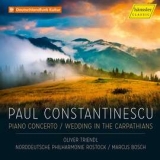Dieses Album ist in mehreren Hinsichten interessant. Gewidmet ist es dem außerhalb Rumäniens kaum bekannten Komponisten Paul Constantinescu (1909 – 1950), neben Georges Enescu wohl der bedeutendste Komponist des Landes. Constantinescu komponierte in nahezu allen Gattungen, zwei Opern, zwei Symphonien, eine Sinfonietta, eine Rhapsodie, eine Chorographische Dichtung, ein Streicherkonzert, ein Tripelkonzert für Violine, Cello und Klavier, ein Harfen-, ein Violin- und ein Klavierkonzert, Freie Variationen über eine byzantinische Weise aus dem 13. Jahrhundert, zwei Byzantinische Oratorien, Streichquartette und Filmmusik.
Vor allem sein Oratorium The Nativity gehört zum schönsten, was ich je in dieser Gattung gehört habe. Auf diesem Album macht der interessierte Hörer nun Bekanntschaft mit seinem großartigen Klavierkonzert aus dem Jahre 1952. Es ist ein wuchtiges Werk, das an die Konzerte von Brahms erinnert, tonal, postromantisch, expressiv und mit rumänisch-byzantinischen Einflüssen, die dem Werk den Hauch des Besonderen verleihen. Ungewöhnlich in Klangsprache und musikalischer Entwicklung ist das rumänische Hochzeitsballett Hochzeit in den Karpathen, das keine schlichte rumänische Tanz- oder Volksmusik ist, sondern ein komplexes und z.T. recht modernes Werk mit einer sehr eigentümlichen, aber immer wieder faszinierenden Sprache.
Oliver Triendls Klavierspiel ist in jedem Moment überragend und er bewegt sich sehr natürlich durch dieses ungewöhnliche Klavierkonzert. Sein Spiel ist äußerst präzise, klangschön und expressiv. Es lotet er die Musik bis in den kleinsten Winkel aus. Die musikalische Leitung hat der hervorragende Marcus Bosch. Sowohl das Klavierkonzert wie auch die komplexe Tanzsuite gewinnen unter seinen Händen an Expressivität, Eleganz, Transparenz und Musikalität.
Großes Lob verdient auch die Norddeutsche Philharmonie Rostock, ein Orchester aus der zweiten Reihe, das aber auf gutem Weg ist, sich weiterzuentwickeln. Hier und da merkt man einige Intonationsschwächen im Blech, aber die Gesamtleistung der Rostocker ist mehr als überzeugend.
This album is interesting for several reasons. It is dedicated to the composer Paul Constantinescu (1909 – 1950), who is hardly known outside Romania and who, along with Georges Enescu, is probably the country’s most important composer. Constantinescu composed in almost all genres, two operas, two symphonies, a sinfonietta, a rhapsody, a choral poem, a string concerto, a triple concerto for violin, cello and piano, a harp concerto, a violin concerto and a piano concerto, free variations on a 13th century Byzantine melody, two Byzantine oratorios, string quartets and film music.
His oratorio The Nativity in particular is one of the most beautiful I have ever heard in this genre. On this album, the interested listener is now introduced to his magnificent Piano Concerto of 1952, a powerful work reminiscent of Brahms’ concertos, tonal, post-romantic, expressive and with Romanian-Byzantine influences that give the work a special touch. The Romanian wedding ballet Wedding in the Carpathians is unusual in its tonal language and musical development. It is not a simple Romanian dance or folk music, but a complex and partly quite modern work with a very peculiar but always fascinating language.
Oliver Triendl’s piano playing is outstanding at every moment and he moves very naturally through this unusual piano concerto. His playing is extremely precise, beautiful and expressive. He explores the music down to the smallest detail. The outstanding Marcus Bosch is the onductor. Both the Piano Concerto and the complex Dance Suite gain in expressiveness, elegance, transparency and musicality in his hands.
The Norddeutsche Philharmonie Rostock also deserves praise, an orchestra of the second tier, but one that is well on the way to further development. Here and there, one notices some intonation weaknesses in the brass, but the overall performance of the Rostock orchestra is more than convincing.
























